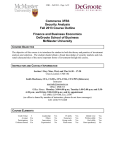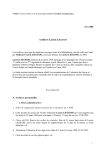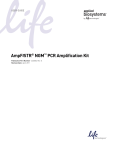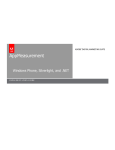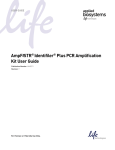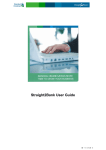Download Course Outline Template
Transcript
3FB3 - Winter 2015 - 1 of 11 Commerce 3FB3 Security Analysis Winter 2015 Course Outline Finance and Business Economics DeGroote School of Business McMaster University COURSE OBJECTIVE The objective of this course is to introduce the student to both the theory and practice of investment analysis and selection. The student should obtain a broad knowledge of portfolio management principles, security markets, and risk-return characteristics of the more important forms of investment through this course. INSTRUCTOR AND CONTACT INFORMATION Section 1: Tue, Wed, and Fri 12:30 – 13:20 Class location: KTH/B124 Instructor: Adam Stivers Office: TBA Office hours: TBA Tel: (905) 525-9140 x 27019 Email: [email protected] TA: Arthur Luo [email protected] Office Hours: TBA Course Website: http://avenue.mcmaster.ca http://connect.mheducation.com/class/a-stiver-winter-2015 COURSE ELEMENTS Credit Value: Avenue: Participation: Evidence-based: 3 Yes Yes Yes Leadership: Ethics: Innovation: Experiential: Yes No Yes No IT skills: Numeracy: Group work: Final Exam: www.degroote.mcmaster.ca Yes Yes Yes Yes Global view: Written skills: Oral skills: Guest speaker(s): Yes No Yes No 3FB3 - Winter 2015 - 2 of 11 COURSE DESCRIPTION The course begins with an overview of the structure of financial markets in Canada and in the United States, followed by a more in-depth analysis of key investment topics. These topics include asset allocation and portfolio management, assessment of portfolio performance, the capital asset pricing model, term structure of interest rates, valuation of stocks and bonds, capital market efficiency, and behavioural finance. This course serves as a useful introduction to the Chartered Financial Analyst (CFA) curriculum (http://www.cfainstitute.org). LEARNING OUTCOMES Upon completion of this course, students should: have a good understanding of various financial assets; have a good understanding of the functioning of securities markets; and more importantly, be able to think logically and systematically about investments. REQUIRED COURSE MATERIALS AND READINGS Avenue registration for course content, readings, and case materials http://avenue.mcmaster.ca Investments: Eighth Canadian Edition, by Z. Bodie, A. Kane, A.J. Marcus, S. Perrakis, P.J. Ryan; McGraw-Hill Ryerson, 2014. Must purchase Connect code (comes with hardcopy, or may purchase standalone code and e-book) A Texas Instruments BA II Plus financial calculator is recommended and will be used in class. However, any calculator that performs time value of money functions is acceptable. EVALUATION Learning evaluation is based on a combination of exams, discussion, projects, assignments, and mock portfolio performance. Students will be encouraged to think, analyze, evaluate, and problem-solve, not memorize. On the exams, I will avoid ask questions involving complicated formula plugins. Students are expected to come to class on time and be prepared for the class, i.e., to have read the assigned readings. Your performance will be evaluated on both individual and group basis. Your final grade will be calculated as follows: Components and Weights 5% McGraw-Hill Connect LearnSmart assignments 20 Investment Challenge And Group Reports 30 Mid-term Exam 45 Final Exam 100% Total NOTE: The use of a financial calculator is allowed during examinations in this course. www.degroote.mcmaster.ca 3FB3 - Winter 2015 - 3 of 11 Investment Challenge The Investment Challenge is offered through the Trading rooms at either RJC or DGB. We will use Thomson-Reuters Eikon to obtain real-time financial information and the Financial Trading System software to facilitate trading and performance tracking. The intent is to provide students the opportunity to gain hands-on experience in trading and portfolio management. The objective of the trading is to maximize your portfolio value. Your beginning investment capital is USD $1,000,000. SUMMARY OF TRADING RULES Students should analyze available economic, financial and corporate data and make portfolio investment decisions using the latest information. A. Trading begins on Monday, January 19, 2015 and continues until Friday April 3, 2015. B. The objective of the trading is to maximize your portfolio value. C. Your beginning investment capital is USD $1,000,000. D. You could buy and short bonds, futures, mutual funds, options, and stocks traded in the United States and Canada. Minimum stock price for buying is $0.25. Minimum stock price for shorting is $3. E. Interest will be earned on all available cash balances and credited at the close of each day. Interest will be calculated using a money market rate. F. A brokerage commission is applied to all transactions. The commission for most trades made on the web page is a flat $10. G. For margin trading, the margin requirement is 50% and interest is charged on daily basis. H. The maximum position for each individual security is $250,000. No day trade (i.e. buying and selling of the same security in the same day) is allowed. I. After the first two weeks, not more than 10% of your portfolio should be put in cash or near cash securities (e.g. T-Bills). This 10% near cash restriction is relaxed in the first two weeks of trading. Use asset allocation to achieve your diversification objective. J. At the end of the trading simulation, you should have invested in bonds, futures, mutual funds, options, and stocks. TRADING FACILITIES 1. Each student has an individual trading account as well as a group trading account. Trades through the individual account are for practice only and have no bearing on evaluation. 2. You can log into FTS at the IDC as well as the GTF. You must use either your group or your individual username and password and with these can only access the McMasters Combined Case. 3. The Eikon user manual is available at each terminal at the IDC or the GTF. To access it log into “virtual desktop” using your Mac ID. 4. You should save your settings on a USB memory stick upon completing a session at the IDC. 5. You can trade at home, in principle, but you will not have access to information and real time quotes from Eikon, cannot be sure of your trade price in advance, and information will be delayed by 15 minutes. 6. To trade at home you must download and install: http://www.ftsmodules.com/public/modules/ftssystemmanager/setupSystemManager.htm In the middle left of the FTS System Manager, select from the dropdown box: “FTS Real Time Client 4.0.0.4” after you select this, you will see the Real Time Instructions on the right side. You must keep www.degroote.mcmaster.ca 3FB3 - Winter 2015 - 4 of 11 the student application box checked. In the FTS Real Time Client window, select “McMasters Combine Case” from the drop down box. Enter Trading Name and Password and click "Login". FINAL GROUP REPORT AND MID-TERM REPORT Each group (there should be three students in each group) must submit a mid-term progress report. In this report, you are expected to: 1. Provide a brief description of your investment strategy, based upon the goal of maximizing your portfolio value. 2. Briefly explain how you executed your investment strategy. 3. Briefly discuss the risk characteristics of your investment strategy. 4. Briefly discuss the portfolio performance thus far, and what improvements you plan to make in the future. The length of the midterm report should not exceed 2 pages, double-spaced. Your mid-term group report is due at the beginning of the mid-term exam. In the more detailed final group report, you are expected to: 1. Provide a detailed description of your investment strategy, based upon the goal of maximizing your portfolio value. 2. Explain how you executed your investment strategy. 3. Discuss the risk characteristics of your investment strategy. 4. Evaluate your track record using standard portfolio performance measures. 5. What you have learned since the mid-term report, how your strategy has changed, and how your portfolio performance has changed. 6. Explain each group member’s contribution to the project The length of your report must not exceed 12 pages, double-spaced, excluding all graphs, tables and references. The 20 marks for the trading project as a whole are comprised of the following: • 2 marks for the midterm report based on the four points above • 8 marks for the final report based on the six points above • 5 marks for the overall portfolio performance and evaluation • 5 marks for the portfolio performance after the mid-term progress report Your final group report is due at the beginning of the final exam. Exams The Midterm and Final Exams are closed book. You will be able to use one note sheet, 8.5 * 11 inches for both the Midterm and Final Exam. You may use the back and the front of the note sheet. You will be responsible for preparing it on your own. Students are allowed to have whatever they want on their note sheet. The note sheet does NOT have to be handwritten. The Midterm Exam is 2 hours long and the Final Exam is 2 ½ hours long. Students must pass the combination of the midterm and final exam in order to pass the course. www.degroote.mcmaster.ca 3FB3 - Winter 2015 - 5 of 11 McGraw-Hill Connect LearnSmart assignments For each chapter starting with Chapter 3 in the second week, there will be a short assignment posted on the textbook’s Connect website. Each chapter’s assignment will have a soft deadline of the Tuesday of that week at 11:59 pm (see marks section below for more). Note that some weeks will have two chapters, with a brief assignment for each. If you choose to read the e-book, you can do the assignment as you read. Or you can read your hardcopy of the textbook, and then answer the questions online. Each question also provides the relevant material to quickly read in order to answer the question. The LearnSmart system analyzes responses to let you know what material or sections you know well, and which you should study more. This should allow you to avoid cramming for the exam and stay current with the lectures, and to use the reports as a study tool. I will have access to a full report to see how many have read the material before class, and I will be able to see what topics were frequently answered incorrectly. The idea is to use this information to lead the discussion in class, and allow you to come to class with questions based on your reading and the assignment. The Tuesday lecture will introduce the chapter material, and then the assignment will be due Tuesday night. The Wednesday and Friday lectures will go into more detail and allow for more questions, based on the reports from LearnSmart. To access Connect, you must enter the Connect code obtained when purchasing the textbook or ebook at the following: http://connect.mheducation.com/class/a-stiver-winter-2015 or http://connect.mheducation.com Connect also has many other resources to help you study, and a notebook that stores your notes and highlighted text. MARKS The chapter assignments (each equally weighted) will comprise 5% of the overall percentage grade. If completed before the soft deadline of Tuesday at 11:59 pm, you will get full marks for answering every question and completing the assignment in full. If you complete the assignment after the deadline, then your answers will be scored and the marks will be assessed based on the number of correct responses. For chapters covered prior to the mid-term, no marks will be given if these chapters’ assignments are completed after the midterm exam. For all other chapters covered after the mid-term, the assignments must be completed prior to the final exam in order to receive marks. www.degroote.mcmaster.ca 3FB3 - Winter 2015 - 6 of 11 Grade Conversion At the end of the course your overall percentage grade will be converted to your letter grade in accordance with the following conversion scheme. LETTER GRADE PERCENT LETTER GRADE PERCENT A+ A A- 90 - 100 85 - 89 80 - 84 C+ C C- 67 - 69 63 - 66 60 - 62 B+ B B- 77 - 79 73 - 76 70 - 72 D+ D D- 57 - 59 53 - 56 50 - 52 F 00 - 49 Communication and Feedback Students who are uncomfortable in directly approaching an instructor regarding a course concern may send a confidential email to the respective Area Chair ([email protected]) or the Associate Dean ([email protected]). Students who wish to correspond with instructors or TAs directly via email must send messages that originate from their official McMaster University email account. This protects the confidentiality and sensitivity of information as well as confirms the identity of the student. Emails regarding course issues should NOT be sent to the Area Administrative Assistants. Instructors are required to provide evaluation feedback for at least 10% of the final grade to students prior to Week #8 in the term. Instructors may conduct an informal course review with students by Week #4 to allow time for modifications in curriculum delivery. Students who wish to have a course component re-evaluated must complete the following form: http://www.mcmaster.ca/policy/Students-AcademicStudies/Form_A.pdf In order for the component to be re-read: • • • • • the component must be worth 10% or more of the final grade in the course students pay a fee of $50 in Gilmour Hall #209 (receipt is then brought to APO) the Area Chair will seek out an independent adjudicator to re-grade the component an adjustment to the grade for the component will be made if a grade change of three points or greater on the 12 point scale (equivalent to 10 marks out of 100) has been suggested by the adjudicator as assigned by the Area Chair if a grade change is made, the student fee will be refunded www.degroote.mcmaster.ca 3FB3 - Winter 2015 - 7 of 11 ACADEMIC DISHONESTY You are expected to exhibit honesty and use ethical behaviour in all aspects of the learning process. Academic credentials you earn are rooted in principles of honesty and academic integrity. Academic dishonesty is to knowingly act or fail to act in a way that results or could result in unearned academic credit or advantage. This behaviour can result in serious consequences, e.g. the grade of zero on an assignment, loss of credit with a notation on the transcript (notation reads: “Grade of F assigned for academic dishonesty”), and/or suspension or expulsion from the university. It is your responsibility to understand what constitutes academic dishonesty. For information on the various types of academic dishonesty please refer to the Academic Integrity Policy, located at www.mcmaster.ca/academicintegrity. The following illustrates only three forms of academic dishonesty: 1. Plagiarism, e.g. the submission of work that is not one’s own or for which other credit has been obtained. 2. Improper collaboration in group work. 3. Copying or using unauthorized aids in tests and examinations. REQUESTING RELIEF FOR MISSED ACADEMIC WORK Students may request relief from a regularly scheduled midterm, test, assignment or other course component in the following two ways: a) for missed coursework worth less than 30% of the final grade (and/or absences lasting less than 5 days); or b) for missed coursework worth 30% or more of the final grade (and/or absences lasting more than five (5) days a) For missed coursework worth less than 30% of the final grade (and/or absences lasting less than five (5) days Students must use the MSAF (McMaster Student Absence Form) for their first incidence of missed coursework worth less than 30% for each term. This is an on-line, self-reporting tool, for which submission of medical or other types of supporting documentation is normally not required. Students may use this tool to submit a maximum of one (1) request for relief of missed academic work per term as long as the weighting of the component is worth 29% of the final grade or less. Students must follow up with their course instructors regarding the nature of the relief within two days of submitting the form. Failure to do so may negate the opportunity for relief. It is the prerogative of the instructor of the course to determine the appropriate relief for missed term work in his/her course. If the value of the component is worth 30% or more, students must report to the APO to discuss their situation and will be required to provide appropriate supporting documentation. www.degroote.mcmaster.ca 3FB3 - Winter 2015 - 8 of 11 b) For missed coursework worth 30% or more of the final grade (and/or absences lasting more than five (5) days Students MUST report to the APO to discuss their situation and will be required to provide appropriate supporting documentation. If approved, students will be given access to the MSAF system where they will be required to enter the details of the missed coursework for which they were approved. Students must follow up with their course instructors regarding the nature of the relief within two days of submitting the form. Failure to do so may negate the opportunity for relief. It is the prerogative of the instructor of the course to determine the appropriate relief for missed term work in his/her course. Students who wish to submit more than one request for relief of missed academic work per term cannot use the online MSAF tool without permission. They must report to the APO and discuss their situation with an academic advisor. They will be required to provide supporting documentation and possibly meet with the Manager. The MSAF cannot be used during any final examination period. Regarding Midterm Conflicts Students unable to write a mid-term at the posted exam time due to the following reasons: religious; work-related (for part-time students only); representing university at an academic or varsity athletic event; conflicts between two overlapping scheduled mid-term exams; or other extenuating circumstances, have the option of applying for special exam arrangements. Please see the DeGroote Missed Course Work Policy for a list of conflicts that qualify for academic accommodation http://ug.degroote.mcmaster.ca/forms-and-resources/missed-course-work-policy/ Such requests must be made to the Academic Programs Office at least ten (10) working days before the scheduled mid-term along with acceptable documentation. Instructors cannot themselves allow students to unofficially write make-up exams/tests. Adjudication of the request must be handled by the Academic Programs Office. If a mid-term exam is missed without a valid reason, students will receive a grade of zero (0) for that component. STUDENT ACCESSIBILITY SERVICES Students who require academic accommodation must contact Student Accessibility Services (SAS) to make arrangements with a Program Coordinator. Academic accommodations must be arranged for each term of study. Student Accessibility Services can be contacted by phone 905525-9140 ext. 28652 or e-mail [email protected]. For further information, consult McMaster University’s Policy for Academic Accommodation of Students with Disabilities. www.degroote.mcmaster.ca 3FB3 - Winter 2015 - 9 of 11 POTENTIAL MODIFICATIONS TO THE COURSE The instructor and university reserve the right to modify elements of the course during the term. The university may change the dates and deadlines for any or all courses in extreme circumstances. If either type of modification becomes necessary, reasonable notice and communication with the students will be given with explanation and the opportunity to comment on changes. It is the responsibility of the student to check their McMaster email and course websites weekly during the term and to note any changes. DETAILS FOR ONLINE COMPONENT In this course we will be using McGraw-Hill Connect and Avenue to Learn. Students should be aware that, when they access the electronic components of this course, private information such as first and last names, user names for the McMaster e-mail accounts, and program affiliation may become apparent to all other students in the same course. The available information is dependent on the technology used. Continuation in this course will be deemed consent to this disclosure. If you have any questions or concerns about such disclosure please discuss this with the course instructor. www.degroote.mcmaster.ca 3FB3 - Winter 2015 - 10 of 11 COURSE SCHEDULE Commerce 3FB3 Security Analysis Winter 2015 Course Schedule DATE CHAPTER January 6, 7, and 9 1 2 January 13, 14, and 16 3 January 20, 21, and 23 4 5 January 27, 28, and 30 6 February 3, 4, and 6 7 8 February 10, 11, and 13 9 10 February 17, 18, and 20 Friday, February 27 Introduction The Investment Environment Financial Markets and Instruments Trading on Securities Markets Assignment: January 13: LearnSmart Chapter 3 Portfolio Theory Return and Risk: Analyzing the Historical Record Capital Allocation to Risky Assets Assignments: January 20: LearnSmart Chapters 4 and 5 Optimal Risky Portfolios Assignment: January 27: LearnSmart Chapter 6 Equilibrium in Capital Markets The Capital Asset Pricing Model Index Models and the Arbitrage Pricing Theory Assignments: February 3: LearnSmart Chapters 7 and 8 Market Efficiency Behavioural Finance and Technical Analysis Assignments: February 10: LearnSmart Chapters 9 and 10 MIDTERM RECESS 21 16 February 24, 25, and 27 TOPIC AND ASSIGNMENT(S) Active Management and Equity Evaluation Active Management and Performance Measurement Equity Evaluation Assignments: February 24: LearnSmart Chapters 21 and 16 Investment Challenge Midterm Report Due before Midterm Exam MIDTERM EXAM (TO BE CONFIRMED) www.degroote.mcmaster.ca 3FB3 - Winter 2015 - 11 of 11 DATE March 3, 4, and 6 March 10, 11, and 13 March 17, 18 and 20 March 24, 25, and 27 March 31, April 1 and April 3 April 7 and 8 April 10 - 30 CHAPTER TOPIC AND ASSIGNMENT(S) 18 Derivatives Options and Other Derivatives Markets: Introduction Assignment: March 3: LearnSmart Chapter 18 19 20 12 13 14 Option Valuation Assignment: March 10: LearnSmart Chapter 19 Futures, Forwards, and Swap Markets Assignment: March 17: LearnSmart Chapter 20 Fixed Income Securities Bond Prices and Yields Assignment: March 24: LearnSmart Chapter 12 The Term Structure of Interest Rates Assignments: March 31: LearnSmart Chapters 13 and 14 Managing Bond Portfolios and Final Review Final Exam Investment Challenge Final Group Report due www.degroote.mcmaster.ca











